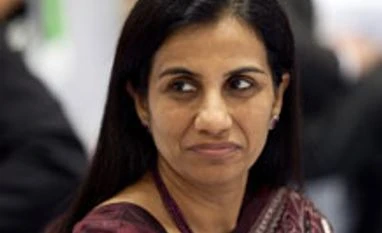As new players get ready to join India's banking space, top banker Chanda Kochhar feels there is space for a few large banks and a large number of other lenders to cater to the country's banking needs.
At the same time, the proposed issuance of differentiated banking licences or licensing of niche banks for specialised segments should not result in any regulatory arbitrage in the system and the core principles should be applied to all new players, said the CEO and Managing Director of ICICI Bank.
"I don't think we need to choose between the two," Kochhar said when asked whether India needs some large banks of global scale, or a larger number of banks.
"So, in my view there is no contradiction. I think we should have a few larger banks and we can always have more banks in the play as well," Kochhar told PTI in an interview.
Last year, RBI had invited applications for new full- fledged banking licences, pursuant to which two entities - IDFC and Bandhan - have been granted in-principle approval from among more than two dozen applicants.
Besides, the central banking authority has said that it would issue guidelines on differentiated and 'on-tap' banking licenses later this year.
RBI floated a discussion paper last year on banking structures in India, wherein it has proposed the concept of differentiated bank licences. Such licences are issued in countries like the US, Australia, Singapore, Hong Kong and Indonesia, among others.
These licences can be issued for setting up payment banks, small banks, rural banks, infrastructure banks, among others.
Asked about the proposed differentiated banking licences, Kochhar said: "Under this regime, the most important thing is that we should not create regulatory arbitrage in the system. The broad playing field has to be levelled, within that people may choose niches.
"Banking means that you access deposits, you have access to payment systems and you make credit and you meet priority sector obligations. So these 3-4 parameters should be relevant for everybody, then within that everybody will choose their field of specialisation."
Among commercial banks present in India, there are 26 public sector banks, 20 private sector banks and 43 foreign banks, besides 64 regional rural banks and 4 local area banks.
In addition, there were 1,606 urban cooperative banks and 93,551 rural cooperative banks as on March 31, 2013.
Among other countries, the US has got some of the biggest banks of global scale, while there are also about 7,000 small community banks with asset size ranging from less than USD 10 million to USD 10 billion or more.
At the same time, the proposed issuance of differentiated banking licences or licensing of niche banks for specialised segments should not result in any regulatory arbitrage in the system and the core principles should be applied to all new players, said the CEO and Managing Director of ICICI Bank.
"I don't think we need to choose between the two," Kochhar said when asked whether India needs some large banks of global scale, or a larger number of banks.
Also Read
Last year, RBI had invited applications for new full- fledged banking licences, pursuant to which two entities - IDFC and Bandhan - have been granted in-principle approval from among more than two dozen applicants.
Besides, the central banking authority has said that it would issue guidelines on differentiated and 'on-tap' banking licenses later this year.
RBI floated a discussion paper last year on banking structures in India, wherein it has proposed the concept of differentiated bank licences. Such licences are issued in countries like the US, Australia, Singapore, Hong Kong and Indonesia, among others.
These licences can be issued for setting up payment banks, small banks, rural banks, infrastructure banks, among others.
Asked about the proposed differentiated banking licences, Kochhar said: "Under this regime, the most important thing is that we should not create regulatory arbitrage in the system. The broad playing field has to be levelled, within that people may choose niches.
"Banking means that you access deposits, you have access to payment systems and you make credit and you meet priority sector obligations. So these 3-4 parameters should be relevant for everybody, then within that everybody will choose their field of specialisation."
Among commercial banks present in India, there are 26 public sector banks, 20 private sector banks and 43 foreign banks, besides 64 regional rural banks and 4 local area banks.
In addition, there were 1,606 urban cooperative banks and 93,551 rural cooperative banks as on March 31, 2013.
Among other countries, the US has got some of the biggest banks of global scale, while there are also about 7,000 small community banks with asset size ranging from less than USD 10 million to USD 10 billion or more.
)